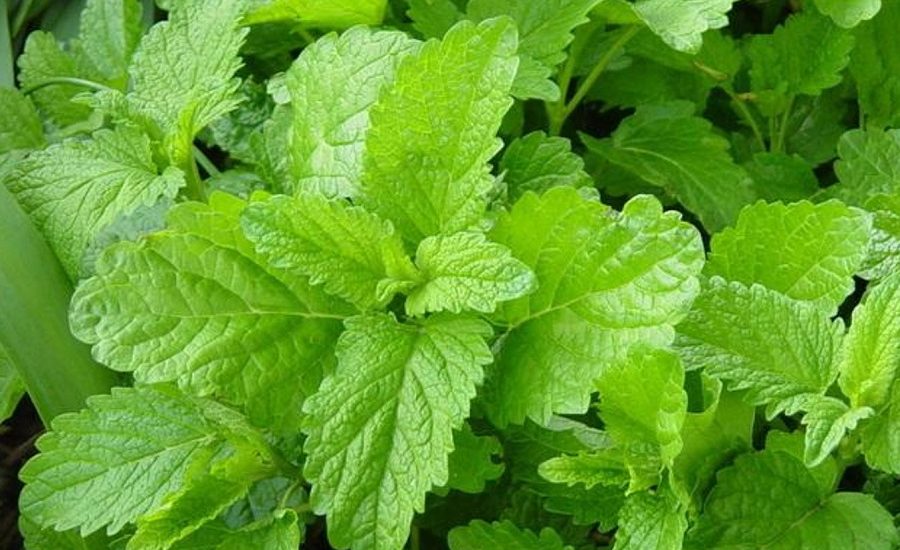Melissa officinalis, known as lemon balm, balm,common balm, or balm mint, is a perennial herbaceous plant in the mint family Lamiaceae, native to south-central Europe, North Africa, the Mediterranean region, and Central Asia.
It grows to 70–150 cm (28–59 in) tall. The leaves have a gentle lemon scent, related to mint. During summer, small white flowers full of nectar appear. It is not to be confused with bee balm (which is genus Monarda). The white flowers attract bees, hence the genus name Melissa (Greek for ‘honey bee’). Its flavour comes from citronellal (24%), geranial (16%), linalyl acetate (12%) and caryophyllene (12%).[
Cultivation
M. officinalis is native to Europe, central Asia and Iran, but is now naturalized around the world.
Lemon balm seeds require light and at least 20 °C (70 °F) to germinate. Lemon balm grows in clumps and spreads vegetatively, as well as by seed. In mild temperate zones, the stems of the plant die off at the start of the winter, but shoot up again in spring. Lemon balm grows vigorously and should not be planted where it will spread into other plantings.
Culinary use
Lemon balm is often used as a flavouring in ice cream and herbal teas, both hot and iced, often in combination with other herbs such as spearmint. It is also frequently paired with fruit dishes or candies. It can be used in fish dishes and is the key ingredient in lemon balm pesto.
Uses in traditional and alternative medicine
In the traditional Austrian medicine, M. officinalis leaves have been prescribed for internal (as tea) or external (essential oil) application for the treatment of disorders of the gastrointestinal tract, nervous system, liver, and bile. It is also a common addition to peppermint tea, mostly because of its complementing flavor.
Lemon balm is the main ingredient of Carmelite Water, which is still for sale in German pharmacies.
Lemon balm essential oil is very popular in aromatherapy. The essential oil is commonly codistilled with lemon oil, citronella oil, or other oils.
Research into possible effects on humans
High doses of purified lemon balm extracts were found to be effective in the amelioration of laboratory-induced stress in human subjects, producing “significantly increased self-ratings of calmness and reduced self-ratings of alertness.” The authors further report a “significant increase in the speed of mathematical processing, with no reduction in accuracy” following the administration of a 300-mg dose of extract.
Lemon balm is believed to inhibit the absorption of the thyroid medication thyroxine.
Recent research found a daily dose of the tea reduced oxidative stress status in radiology staff who were exposed to persistent low-dose radiation during work. After only 30 days of taking the tea daily, consuming lemon balm tea resulted in a significant improvement in plasma levels of catalase, superoxide dismutase, and glutathione peroxidase, and a marked reduction in plasma DNA damage, myeloperoxidase, and lipid peroxidation.
The crushed leaves, when rubbed on the skin, are used as a mosquito repellent.
Lemon balm is also used medicinally as an herbal tea, or in extract form. It is used as an anxiolytic, mild sedative, or calming agent. At least one study has found it to be effective at reducing stress, although the study’s authors call for further research.Lemon balm extract was identified as a potent in vitro inhibitor of GABA transaminase, which explains anxiolytic effects. The major compound responsible for GABA transaminase inhibition activity in lemon balm was then found to be rosmarinic acid.
Lemon balm and preparations thereof also have been shown to improve mood and mental performance. These effects are believed to involve muscarinic and nicotinic acetylcholine receptors. Positive results have been achieved in a small clinical trial involving Alzheimer patients with mild to moderate symptoms.Essential oils obtained from Melissa officinalis leaf showed high acetylcholinesterase and butyrylcholinesterase co-inhibitory activities.
Its antibacterial properties have also been demonstrated scientifically, although they are markedly weaker than those from a number of other plants studied.The extract of lemon balm was also found to have exceptionally high antioxidant activity.
Lemon balm is mentioned in the scientific journal Endocrinology, where it is explained that Melissa officinalis exhibits antithyrotropic activity, inhibiting TSH from attaching to TSH receptors, hence making it of possible use in the treatment of Graves’ disease or hyperthyroidism.
Το Μελισσοχορτο (Melissa) προέρχεται από το φυτό με την κοινή ονομασία Melissa Officinalis και είναι το γνωστό ελιξήριο της ζωής του αλχημιστή Παράκελσου.Το αιθέριο έλαιο του Μελισσόχορτου προέρχεται από απόσταξη ατμού των φύλλων του και έχει ένα απαλό και ζεστό άρωμα, με μια νότα μελιού. Είναι ιδιαίτερα σπάνιο και συνήθως απαντάται σε μορφή μείγματος με άλλα ομοειδή στις ιδιότητες έλαια.
Τo αιθέριο έλαιο του Μελισσόχορτου χρησιμοποιείται στην αρωματοθεραπεία για τη νευρικότητα, την ένταση, το στρες, τις αϋπνίες, τις μολύνσεις, τις μυκητιάσεις, το έκζεμα, τον έρπητα και τις ιώσεις. Επίσης ως αντικαταθλιπτικό, αντισηπτικό, βακτηριοκτόνο, ηρεμιστικό, υπνωτικό, ενάντια στην υψηλή πίεση και την ευερεθιστότητα, ηρεμεί το νου και ευεργετεί το καρδιαγγειακό σύστημα.
Τo αιθέριο έλαιο του Μελισσόχορτου συνδυάζεται πολύ καλά με: Λεβάντα, Νερολί, Τριαντάφυλλο, Ρωμαϊκό Χαμομήλι, Περγαμόντο, Κέδρο, Γεράνι, Γιασεμί, Λεμόνι, Mαντζουράνα, Yλανγκ υλανγκ.




